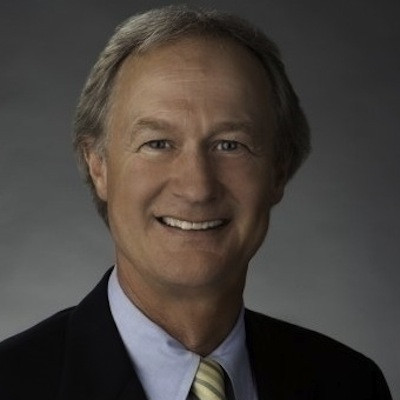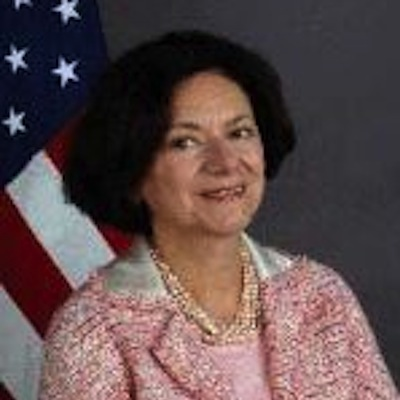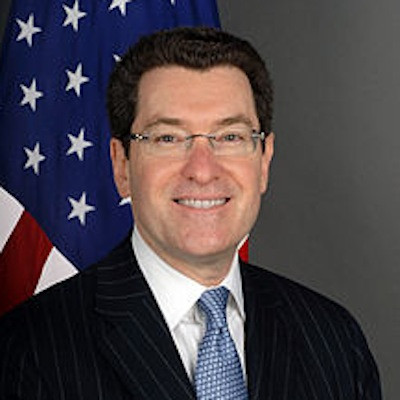NEW: Brown President Addresses Kelly Lecture Incident
Wednesday, November 06, 2013
GoLocalProv News Team
Brown President Christina H. Paxson issued a letter today to the Brown Community, addressing
last week's interrupted lecture by New York City Police Commissioner Raymond Kelly. The lecture, which was scheduled for October 29 at the Taubman Center for Public Policy and American Institutions, was cancelled after more than 30 minutes of interruption and protests by students and the general public.
November 6, 2013
Dear Members of the Brown Community,
GET THE LATEST BREAKING NEWS HERE -- SIGN UP FOR GOLOCAL FREE DAILY EBLAST
On October 29, 2013, a planned public lecture and opportunity for questions and answers with New York City Police Commissioner Raymond Kelly, hosted by the Taubman Center for Public Policy and American Institutions, was interrupted by members of the audience, which included members of the Brown and broader Providence communities.
The campus discussion of this incident has been difficult. The day after the lecture, I held a forum at which more than 600 students, faculty, and staff came together to talk about the episode. I learned a great deal from this and subsequent discussions. It is impossible not to empathize with our students who strongly object to stop-and-frisk policies and racial profiling. Their feelings, in many cases based on personal experiences, are visceral, raw and genuine. I also understand the concerns of students and others who were upset and affronted that they did not have the opportunity to hear Commissioner Kelly speak and to ask him questions. These different points of view have resulted in an intense debate about whether, in some cases, disrupting a campus lecture is an acceptable form of protest.
I strongly believe that Brown must be a place that supports the free exchange of ideas, even if it means making space for points of view that are controversial or deeply upsetting. The central mission of Brown is to discover, communicate and preserve knowledge and understanding in a spirit of free inquiry. Ideas, expressed in writing and in speech, are the basic currency of the University’s work. Impeding the flow of ideas undermines Brown’s ability to fulfill its mission. Making an exception to the principle of open expression jeopardizes the right of every person on this campus to speak freely and engage in open discussion. We must develop and adhere to norms of behavior that recognize the value of protest and acknowledge the imperative of the free exchange of ideas within a university.
This view is laid out in the Brown Code of Student Conduct, which all students indicate acceptance of before enrolling. The section on “ Protest and Demonstration Guidelines ” states the following:
“Protest is a necessary and acceptable means of expression within the Brown community. However, protest becomes unacceptable when it obstructs the basic exchange of ideas. Such obstruction is a form of censorship, no matter who initiates it or for what reasons.”
The Guidelines describe acceptable means of protest, such as picketing, as well as unacceptable means, such as interrupting or halting a lecture, debate or any public forum. To prevent similar episodes in the future—something we must do—these standards of conduct will be upheld and enforced.
The University bears responsibility for the events of last week. Brown hosts controversial speakers on a regular basis. Clearly, something went awry in the planning and oversight of this particular lecture. There is a need to establish the simple facts of what happened and why, so that this kind of episode does not recur.
Given the extraordinary nature of these events and the multiple strands requiring review and discussion, I will establish a Committee on the Events of October 29th that will be charged with making findings and recommendations to me in two phases. In the first phase, which will conclude quickly, the Committee will review the activities and circumstances related to the October 29 lecture and identify issues that may have contributed to the disruption.
In similar episodes that have occurred at Brown in the past, students who violated the Code of Student Conduct have been asked to accept responsibility for their actions. After the findings from the first phase of the Committee’s work are complete, we will determine whether individuals or organizations involved should be referred to the University’s established processes for resolving alleged violations of the Code of Student Conduct.
In the second phase, the Committee will address the broader issues of campus climate, free expression, and dialogue across difference that have been the context for much of the discussion and activity of the last week. Specifically, the Committee will make recommendations regarding how the University community can maintain an inclusive and supportive environment for all of our students while upholding our deep commitment to the free exchange of ideas.
The Committee will include five members of the faculty, two undergraduates and one graduate student and will receive staff support from the Offices of Student Life and General Counsel. I will appoint the members of the Committee in consultation with the Faculty Executive Committee and relevant student groups.
It is clear from the many conversations that I have been part of over the last week that the Brown community has many issues to work through together. I am encouraged by the spirit of the discussion that is now taking place on campus. Students, faculty and staff are engaged in necessary and intense conversations about issues of race, class and privilege; the value of protest in driving social change; and the importance of free expression on a college campus. These conversations underscore the importance of the free and open exchange of ideas around society’s most difficult questions, and they make us stronger as a community.
Sincerely,
Christina H. Paxson
See the original letter here.
The protests, which gained national attention, were related to New York's controversial "stop-and-frisk" policy.
Related Slideshow: The Brown Alumni Who Run This Country
Let's take a look at the Brown University graduates who currently play vital roles in running this country:
 View Larger +
View Larger +
Prev
Next
Jack A. Markell
Governor of Delaware (2009 - Current)
Class of 1982
After obtaining his undergraduate degree in economics and graduate studies from Brown in 1982, Governor Markell went on to earn his MBA at the University of Chicago. He left the private sector in 1998 upon his election as State Treasurer of Delaware, a role which he served until becoming his home state's Governor in 2009.
Photo: SenRockefeller, Flickr
 View Larger +
View Larger +
Prev
Next
Piyush "Bobby" Jindal
Governor of Louisiana (2008 - Current)
Chairman of the Republican Governors Association
Class of 1992
Governor Jindal is one of the more recognizable names to come out of Brown, largely due to his role in dealing with the Deepwater Horizon oil spill off of his state's coast in 2010. He earned degrees in biology and public policy from Brown in 1991, and has since held many public offices; including a term in Congress as the Representative of Louisiana's 1st District.
Photo: Derek Bridges, Flickr
 View Larger +
View Larger +
Prev
Next
Lincoln Chafee
Governor of Rhode Island (2011 - Current)
Class of 1975
Rhode Island born and bred, Governor Chafee has been in the public sector for most of his adult life. After serving as Mayor of Warwick, he followed in his father John Chafee's footsteps, becoming a U.S. Senator before becoming Rhode Island's 74th Governor. He recently announced that he would not seek re-election in 2014.
 View Larger +
View Larger +
Prev
Next
Maggie Hassan
Governor of New Hampshire (2013 - Current)
Class of 1980
After Graduating from Brown in 1980, Governor Hassan went on to the Northeastern University School of Law. After working as an attorney for several years, Hassan went on to hold a seat in the New Hampshire State Senate for three terms before losing her seat in 2010. She won last year's Gubernatorial election, carrying every county in New Hampshire.
Photo: Roger H. Goun, Wikimedia
 View Larger +
View Larger +
Prev
Next
David Cicilline
U.S. Representative - Rhode Island - 1st District (2011 - Current)
Class of 1983
Along with John F. Kennedy Jr., Cicilline established Brown University's branch of the College Democrats of America. He held several roles in Rhode Island politics, including Mayor of Providence from 2003 to 2011 before representing Rhode Island's 1st District in the U.S. House.
 View Larger +
View Larger +
Prev
Next
Dan Maffei
U.S. Representative - New York - 24th District (2013 - Current)
Formerly U.S. Representative - New York - 25th District (2009 - 2011)
Class of 1990
Representative Maffei received his degree from Brown in history before beginning a career in journalism. He worked as a reporter and producer for ABC's Syracuse, NY affiliate for several years, then worked behind the scenes in politics until deciding to run for office himself.
 View Larger +
View Larger +
Prev
Next
John Hugh "Buddy" Dyer
Mayor of Orlando, FL (2003 - Current)
Class of 1980
Mayor Dyer received a law degree from the University of Florida after earning his Bachelor's Degree from Brown. He went on to serve ten years in Florida's State Senate before becoming Orlando's 32nd Mayor.
Photo: Carol Cox, Flickr
 View Larger +
View Larger +
Prev
Next
Janet Yellen
Federal Reserve Board of Governors: Vice Chair (2010 - Current)
Federal Reserve Board of Governors: Chair (Nominated)
Class of 1967
Yellen graduated summa cum laude from Brown University in 1967 with a degree in Economics. She went on to hold many prestigious titles in the field of economics, including serving as Chair of the Council of Economic advisers under President Bill Clinton. She was recently nominated by Barrack Obama to become the Chair of the Federal Reserve, if confirmed, she will become the first woman in U.S. history to hold that title.
 View Larger +
View Larger +
Prev
Next
Richard G. Olson
U.S. Ambassador to Pakistan (2012 - Current)
Class of 1981
Ambassador Olson graduated with honors from Brown with 1991 with a degree in law and society. Before being appointed to his current role, he also served as Ambassador to the United Arab Emirates, U.S. Consul General in Dubai, and as Deputy Chief of Mission to the the U.S. Mission to NATO.
 View Larger +
View Larger +
Prev
Next
Rosemary DiCarlo
U.S. Deputy Permanent Representative to the United Nations (2010 - Current)
Class of 1969 (M.A. 1971, Ph.D. 1979)
Ambassador Dicarlo has led a very distinguished career in diplomacy following her graduation from Brown University. She has received multiple honors, including the Department of Sate's Sustained Superior Achievement Award. She also served as acting U.S. Ambassador to the UN in July of 2013.
 View Larger +
View Larger +
Prev
Next
Thomas Perez
U.S. Secretary of Labor (2013 - Current)
Class of 1983
Following his 1983 graduation from Brown, Secretary Perez began a long and distinguished career in the public sector. Before the 2013 appointment to his current role, Perez worked for the Department of Justice as Assistant Attorney General in their Civil Rights Division.
 View Larger +
View Larger +
Prev
Next
Jim Yong Kim
President of the World Bank Group (2012 - Current)
Class of 1982
Before being elected as the 12th President of the World Bank Group, Dr. Jim Yong Kim was a shining star at Brown. He graduated magna cum laude in 1982, and went on to become a physician and anthropologist, serving as an adviser to the World Health Organization. In 2009, he was named President of Dartmouth College, becoming the first Asian-American to head an Ivy League school.
 View Larger +
View Larger +
Prev
Next
Norman L. Eisen
U.S. Ambassador to the Czech Republic (2011 - Current)
Class of 1985
After graduating with honors from Brown in 1985, Ambassador Eisen went on to study at Harvard Law and was classmates owith future President, Barack Obama. In the private sector, Eisen made a name for himself, earning the distinction as one of Washington's top lawyers by Washingtonian Magazine.
 View Larger +
View Larger +
Prev
Next
Adam Namm
U.S. Ambassador to Ecuador (2012 - Current)
Class of 1985
Ambassador Namm graduated magna cum laude from Brown in 1985 with a degree in International Relations. He has spent his entire career in foreign service, and was the Acting Director of the Bureau of Overseas Buildings Operations before being appointed to his current post.
 View Larger +
View Larger +
Prev
Next
David Wade
Chief of Staff to Secretary of State John Kerry (2013 - Current)
Class of 1997
While at Brown, Mr. Wade was awarded the prestigious Harry S. Truman scholarship. He went on to serve some of this Nation's top leaders, first acting as Joseph Biden's National Spokesman and Communications Advisor. He then became Senator John Kerry's Chief of Staff in 2008, transitioning with the same title in Kerry's new role as Secretary of State.
Related Articles
Enjoy this post? Share it with others.

































